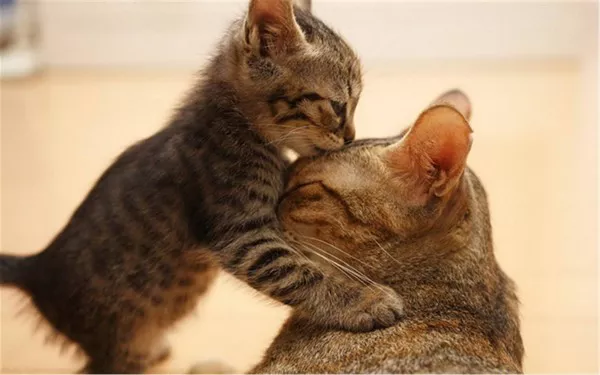The Cornish Rex, with its distinctive wavy coat and playful personality, has captivated cat enthusiasts for decades. But a common misconception surrounds this breed: that it is a result of crossing two specific breeds. In actuality, the Cornish Rex is a single breed that arose from a natural genetic mutation. This article delves into the fascinating history and unique characteristics of the Cornish Rex, dispelling the myth of its hybrid origin.
A Serendipitous Discovery:
The story of the Cornish Rex begins in Cornwall, England, in the 1950s. A litter of kittens born to a tortoiseshell and white domestic shorthair included a unique male kitten with an unusually short, wavy coat. This kitten, named Kallibunker, became the foundation of the Cornish Rex breed.
Initially, breeders believed that Kallibunker’s distinctive coat resulted from crossing a Devon Rex with another breed. However, breeding experiments disproved this theory. When Kallibunker was bred back to his mother, some of the kittens inherited his wavy coat, demonstrating that the trait was a recessive mutation within the domestic shorthair population.
The Rex Mutation:
The Cornish Rex’s unique coat is caused by a recessive gene that affects hair growth. This gene alters the structure of the hair follicles, resulting in short, soft, and wavy fur. Unlike other cat breeds, the Cornish Rex lacks the usual three types of hair: guard hairs, awn hairs, and down hairs. Instead, they only have a fine layer of downy hair, giving them a remarkably soft and silky texture.
Beyond the Coat:
While the Cornish Rex’s coat is undoubtedly its most defining feature, the breed boasts other distinctive characteristics:
Slender and athletic build: Cornish Rexes are known for their slender bodies, long legs, and large, bat-like ears. Their athleticism and agility make them excellent jumpers and climbers.
Playful and energetic personality: These cats are renowned for their playful and mischievous nature. They retain their kitten-like energy well into adulthood and enjoy interactive games and activities.
Highly intelligent: Cornish Rexes are intelligent and can be trained to perform tricks. They are also known for their curious and inquisitive nature.
Social and affectionate: These cats thrive on human interaction and form strong bonds with their owners. They are generally friendly and outgoing, often seeking attention and affection.
Debunking the Myth:
The misconception that the Cornish Rex is a cross between two specific breeds likely stems from the existence of other Rex breeds, such as the Devon Rex. While both breeds share the distinctive wavy coat, they are genetically distinct. The Devon Rex mutation occurred independently from the Cornish Rex mutation, and each breed carries a different recessive gene responsible for the coat texture.
Furthermore, attempts to crossbreed Cornish Rexes with Devon Rexes have resulted in kittens with straight coats, further confirming that the two mutations are separate and unrelated.
A Unique and Enigmatic Breed:
The Cornish Rex, with its distinctive appearance and playful personality, stands as a testament to the fascinating diversity within the feline world. This breed, born from a chance mutation, serves as a reminder that nature is full of surprises and that beauty can be found in unexpected places.
See Also:Can Cornish Rex Have Short Hair?
Understanding the true origin of the Cornish Rex allows us to appreciate its unique genetic heritage and dispel any misconceptions surrounding its lineage. This captivating breed continues to charm cat lovers worldwide with its playful spirit, silky coat, and captivating personality.
Beyond the Basics:
Now that we have established the Cornish Rex as a distinct breed with a unique mutation, let’s delve deeper into some additional aspects:
Health and Care: Cornish Rexes are generally healthy cats, but they can be prone to certain health issues like hypertrophic cardiomyopathy (HCM) and patellar luxation. Regular veterinary checkups and a balanced diet are essential for maintaining their health. Their short coat requires minimal grooming, but occasional baths can help remove any dirt or debris.
Suitability as Pets: Cornish Rexes are highly social and thrive on human interaction. They are not suited to being left alone for long periods and require an owner who can provide ample playtime and attention. Their playful and energetic nature makes them ideal for active families or individuals who can engage them in stimulating activities.
Finding a Reputable Breeder: If you are considering adding a Cornish Rex to your family, it is crucial to find a reputable breeder who prioritizes the health and well-being of their cats. Responsible breeders will conduct genetic testing to screen for potential health issues and ensure proper socialization of the kittens.
Conclusion:
The Cornish Rex, with its unique appearance and engaging personality, is a captivating breed that continues to fascinate cat enthusiasts. Understanding its true origin as a single breed arising from a natural mutation allows us to appreciate its unique place in the feline world. By dispelling the misconception of its hybrid origin, we can celebrate the Cornish Rex for its own distinctive qualities and recognize the remarkable role of genetic diversity in shaping the wonderful world of cats.
Related Topics:
When Will My Cornish Rex Calm Down?
When Will My Cornish Rex Get Fluffy?
Can Cornish Rex Cats Enjoy Scrambled Eggs?


























